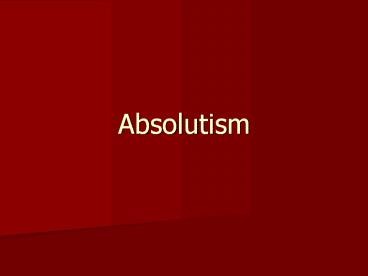Absolutism - PowerPoint PPT Presentation
Title:
Absolutism
Description:
Absolutism - Weebly ... Absolutism – PowerPoint PPT presentation
Number of Views:122
Avg rating:3.0/5.0
Title: Absolutism
1
Absolutism
2
- Divine Right
- The power for the monarch to rule comes from God
and that the king is an agent of God. - Absolute monarchs used this power to justify
their rule. - Divine Right allowed the monarch to control all
aspects of the government because the people
believed that monarch was Gods agent on earth.
3
- Louis XIV(14)
- He was the 14th king of France.
- He was an absolute Monarch during the 17th
century. - Louis XIV was the only one to totally free
himself from the Parliament, which controlled the
King. - Louis XIV coined the phrase L'état, c'est moi,
which means I am the state. - Louis XIV centralized the government and made all
the laws for France - Louis XIV put France into debt by spending money
building the Palace of Versailles and fighting
wars.
4
- Peter the Great
- Peter the Great was an absolute monarch in
Russia, he was the czar from 1682 to 1725. - He worked to centralize royal power
- Reduced the power of nobility and gained control
of the Russian Orthodox Church. - Peter wanted to modernize Russia. He traveled
from Western European cities to study western
technology and brought back the ideas to
westernize Russia. - Simplified Russian Alphabet, developed mining and
textiles. - Peter sometimes resorted to force and terror to
achieve his goals. - Created the largest army in Europe in the late
1600s and used it to expand Russian territory.
5
- Westernization under Peter
- Peter wanted a modernized Russia, went to Western
Europe to study technology, brought back ideas,
simplified the Russian alphabet, developed mining
and textiles, capital at St. Petersburg served as
symbol of new Russia, used force and terror to
gain goal
6
- Petition of Rights(1628)
- King Charles I had to call Parliament to ask for
money - They refused to give him any until he signed the
Petition of Rights - In the Petition the king agreed to
- Not imprison subjects without due cause
- Not levy taxes without Parliaments consent
- Not house soldiers in private homes
- Not impose martial law in peacetime
- The king agreed to the Petition but after he
ignored it - The petition was important because it set forth
the idea that the law was higher even then the
king.
7
- English Civil War
- Charles I offended the puritans by upholding
church rituals and a former prayer book - Charles tried to force the Presbyterian Scots to
accept a version of the Anglican prayer book - Lead to a conflict between the supporters of
parliament and the supporters of English monarchy
from 1642-1649
8
- Oliver Cromwell
- Was a skilled military leader who overthrew the
British king. - King Charles I was put in prison and put on
trial. He was sentenced to death by way of
beheading. He was the first king to be executed
by his own subjects. - After the kings execution Parliaments House of
commons abolished the monarchy, the House of
Lords, and the official Church of England.
England became a Commonwealth. - Charles II the heir to the throne revolted
against Cromwell and attacked England from
Ireland and Scotland. Cromwell sent troops into
Ireland and Scotland to crush the uprising. - Cromwell took the title of Lord Protector. At
the time of his death in 1658 many people were
tired of Puritan rule.
9
- The Restoration
- During the year of 1660, Parliament asked Charles
II to become the King of England. - When Parliament asked Charles II to become King
it marked the restoration of the Stuart monarchy. - In 1685 James II, who was Charles brother
inherited the throne in England. - James II who was currently King in England, was
unpopular to the people because of his
Catholicism and his Absolutist policies.
10
- The Glorious Revolution (1688)
- Parliament feared Catholic dominance
- Mary and William (Dutch) take English throne.
- Both protestant.
- When they arrived, James II fled.
- Bloodless overthrow of power.
11
- English Bill of Rights
- The bill was drafted in 1689.
- England had become a constitutional monarchy
meaning there were laws that limited the rulers
power. - The English Bill of Rights listed the things the
leader could not do. - There were four laws- 2 dealt with not
interfering with Parliament speech or laws and 2
dealt with not taxing the citizens without the
consent of Parliament and letting the citizens
petition.
12
- Magna Carta
- Great Charter
- A document guaranteeing basic political rights in
England, drawn up by nobles and approved by King
John in A.D. 1215. - This charter was a form of revolt, rebelling
against the unfair leadership of King John. - John failed as a military leader. He was horrible
to his subjects and tried to squeeze money out of
them. To finance his wars, John raised taxes to
an all-time high. - The nobles wanted to guarantee certain basic
political rights and limit the power of the king. - Guaranteed rights included no taxation without
representation, a jury trial, and the protection
of the law.
13
- Limited monarchy (1660)
- Started after the restoration
- Passing of habeas corpus act
- Parliament passed the bill of rights in 1689
- No monarch could rule without parliaments consent
- Also called a constitutional monarchy































